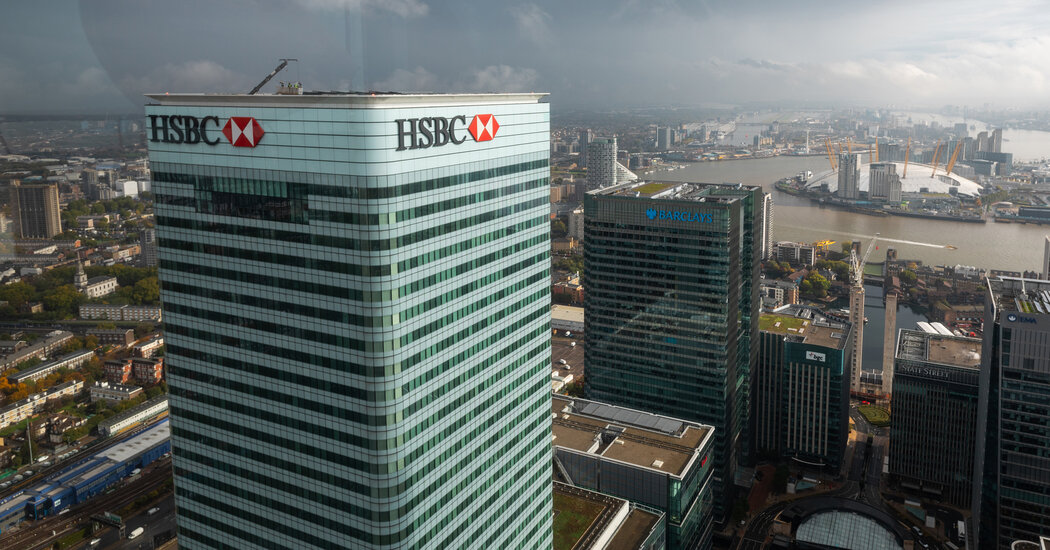For many investors, HSBC, Europe’s largest lender with a venerable place in the UK banking sector, has little to criticize: it is performing well and has focused on its most profitable and fastest growing businesses, those in Asia.
But for the company’s largest investor, sprawling Chinese insurance giant Ping An, that’s not enough.
For the past year, Ping An has been campaigning to convince HSBC to somehow spin off its Hong Kong-based operations, cracking open the bank’s global empire to improve its financial performance. It is a move that the HSBC board has vigorously opposed because it is costly and ineffective.
The clash will come to a head at HSBC’s annual shareholder meeting on Friday in the English city of Birmingham, where investors will vote on two proposals backed by Ping An, including one that would prompt the bank to regularly consider restructuring its global structure. refresh.
Those initiatives face long odds, even with Ping An owning an 8 percent stake. Influential investor advisory firms opposed the measures and HSBC’s latest financial results have been strong, with earnings well above expectations. But Ping An, who first invested in HSBC in 2017, has shown little inclination to walk away.
From its founding in 1865 in Hong Kong, HSBC was intended to bridge east and west. It has since moved its headquarters to Britain and expanded its financial reach globally, with nearly $3 trillion in assets placing it among the top 10 largest banks in the world.
Still, the company continues to derive nearly half of its sales from customers in Asia, including Hong Kong and mainland China, with the rest coming from Europe, the Middle East and North America. And it has moved to sell off operations in minor markets, including retail banking in Canada and the United States.
The uniquely strong presence of a Western bank in growing Asian markets provides HSBC with a solid foundation, especially as the Chinese economy emerges from pandemic lockdowns.
But according to Ping An and some other investors, the bank hasn’t done enough to strengthen its China-focused businesses, instead siphoning money from them to support slower-growing activities in the West. Particularly distressing for those shareholders was HSBC’s halt to its stock dividend payments in early 2020 after the Bank of England banned UK banks from paying them to save capital during the pandemic.
The insurer is also concerned that HSBC will be hurt by geopolitical tensions between Beijing and the West. The bank was criticized in China for aiding the US prosecution of Meng Wanzhou, the chief financial officer of telecommunications giant Huawei. But it also drew rebukes from US lawmakers for freezing the accounts of pro-democracy activists in Hong Kong at the behest of local authorities, and for the then-head of HSBC’s Asia operation publicly supporting a national security bill imposed by Beijing in the area.
Ping An is a behemoth in itself: it is the world’s largest insurance company, but also offers healthcare and banking. It has pressured HSBC executives to consider different ways to break down its Asian business, but this has been repeatedly rejected. Last month, it backed its support for shareholder proposals to require HSBC to regularly review its structure and restore dividends to pre-pandemic levels.
“We are deeply disappointed by HSBC’s management’s consistent narrow-minded attitude towards all solutions,” Michael Huang, the CEO of Ping An’s asset management arm, said in a statement.
In response to the concerns of HSBC’s management, Ping An has proposed listing the bank’s Hong Kong arm as a separate publicly traded company, while HSBC retains majority ownership.
Even then, the bank said it was not convinced. That position was supported by shareholder advisory firms that advise investors on how to vote in corporate elections. One of them, Institutional Shareholder Services, cited a “lack of detailed rationale consistent with the implications of the proposal” in recommending a rejection of the plan.
Days before Friday’s annual meeting, HSBC’s first-quarter earnings report likely received further support from other investors. The lender said its earnings beat investors’ expectations: After-tax revenue more than tripled from a year ago to $11 billion, thanks to higher interest income and one-time accounting gains.
“It’s hard to put holes” in the results, Perlie Mong, a research analyst at Keefe, Bruyette & Woods, said in a telephone interview. “It’s a really strong beat.”
Of greater interest to troubled shareholders was HSBC’s commitment to buy back up to $2 billion of its own shares – a move to boost the share price – and to pay a quarterly dividend for the first time since 2019. The bank’s CEO, Noel Quinn, suggested that the lender could return more money to investors and cited the results as evidence of a winning strategy.
“I believe our first quarter results reinforce our recommendations and demonstrate that our current strategy is the fastest and safest way to improve returns,” Quinn told analysts Tuesday.
In a statement, Ping An said the positive results were a result of accounting measures and rate hikes, and said it still supported shareholder proposals.

